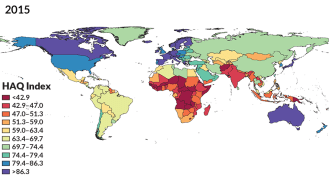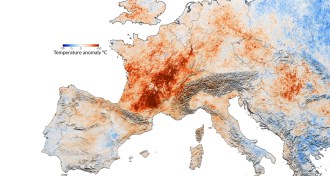Science Stats
-
 Health & Medicine
Health & MedicineOne in three U.S. adults takes opioids, and many misuse them
More than a third of U.S. adults used prescription opioids in 2015, and nearly 13 percent of that group misused the painkillers in some way.
By Kate Travis -
 Ecosystems
EcosystemsEarth’s dry zones support a surprising number of trees
A Google Earth-based estimate of dryland forests adds serious leafage to Earth’s total tree count.
By Beth Geiger -
 Health & Medicine
Health & MedicineGlobal access to quality health care has improved in the last two decades
Health care quality and availability improved worldwide from 1990 to 2015, but the gap between countries with the lowest and highest levels of care widened.
-
 Health & Medicine
Health & MedicineColorectal cancer is on the rise among younger adults
Colorectal cancer rates in the United States have increased in people younger than 50.
-
 Animals
AnimalsToo many stinkbugs spoil the wine
Stinkbugs can ruin wine if enough are accidentally processed alive with the grapes. Three or fewer stinkbugs per grape cluster don’t have a noticeable effect on red wine.
-
 Environment
EnvironmentHumans’ stuff vastly outweighs humans
The human-made technosphere weighs 30 trillion tons and surpasses the natural biosphere in mass and diversity, researchers estimate.
-
 Health & Medicine
Health & MedicineBirth defects occur in 1 in 10 pregnancies with first trimester Zika infection
About 6 percent of U.S. women infected with Zika virus have infants or fetuses with birth defects, according to preliminary CDC results. For women infected in the first trimester, the number is even higher: nearly 11 percent.
By Meghan Rosen -
 Health & Medicine
Health & MedicineCDC sounds alarm on STDs
The combined reported cases of three common sexually transmitted diseases reached a historic peak in 2015, a new CDC report says.
-
 Astronomy
AstronomyThe sun isn’t the only light source behind that summer tan
About 99.999% of the light that creates a suntan comes from the sun; the rest comes from the Big Bang and galaxies throughout the universe.
-
 Climate
ClimateGlobal warming amplified death toll during 2003 European heat wave
Climate change caused hundreds of fatalities in London and Paris during the 2003 European heat wave, simulations suggest.
-
 Astronomy
AstronomyMagnetic fields in sun rise at 500 kilometers per hour
Magnetic fields within the sun rise up no faster than about 500 kilometers per hour, suggesting that the movement of gas is responsible for bringing these fields to the sun’s surface.
-
 Health & Medicine
Health & MedicineU.S. lags in road safety
The U.S. tops the list of 19 high-income countries for deaths from motor vehicle crashes.
By Alex Maddon